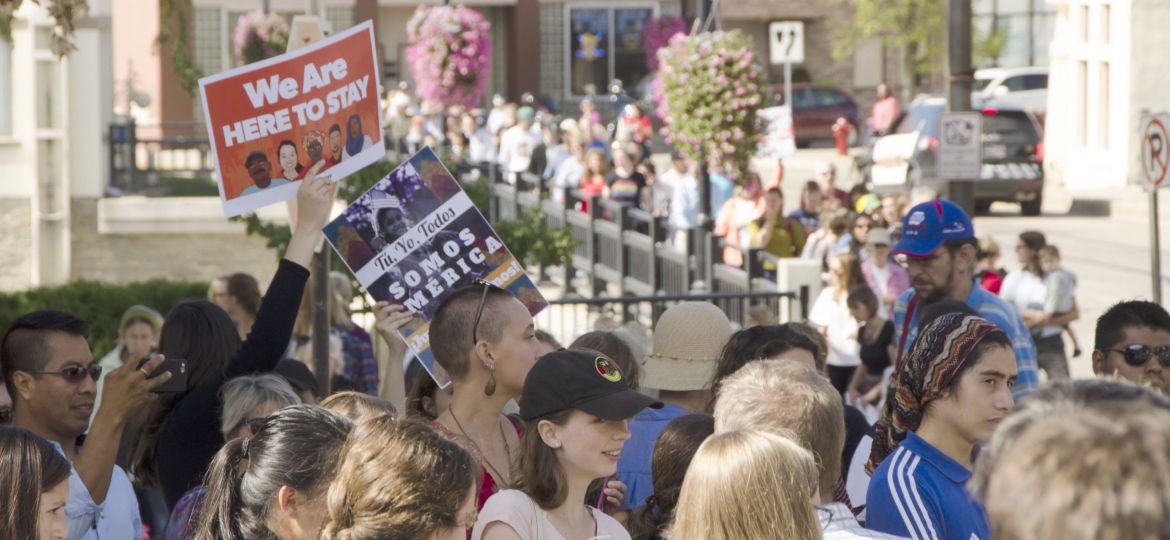
On Tuesday, Sept. 5, St. Olaf College administrators issued a swift response to the bombshell announcement that the Trump administration would be rescinding the Deferred Action for Childhood Arrivals (DACA) program, proclaiming that the college would “protect our students to the extent we are able under the law.” In the response, the college expressed concern over the negative impact the White House’s decision may have on St. Olaf’s DACA participants – often referred to as Dreamers – and pledged support for enshrining DACA protections into law.
Established in 2012, the DACA program created an application process in which undocumented immigrants who arrived in the United States as children could obtain a “deferred action” commitment from the federal government which would temporarily shield them from deportation. DACA provided these individuals with two year, renewable work permits and social security numbers. Under the Trump administration’s new policy, the federal government is no longer accepting new DACA applications, and will no longer renew permits after March 5. As a result, DACA will slowly wind down as participants’ permits expire.
The Office of Marketing and Communications team began crafting the college’s statement shortly after the announcement, with input from the President’s Leadership Team and President David Anderson ’76.
“There was deep concern for the welfare of Dreamers on campus, and there was an immediate desire to get a response out so that our position was crystal clear,” St. Olaf General Counsel Carl Lehmann ’91 said.
The college’s position of support faces some formidable legal obstacles. The college has a limited ability to prevent Immigrations and Customs Enforcement (ICE) from carrying out deportation proceedings against any undocumented students on campus, and would need to comply with any court orders or subpoenas.
However, according to Lehmann, the college is nonetheless “not required to and not inclined to cooperate in identifying individuals or assisting with any efforts that would result in deportation of students.” Furthermore, few administrators at the college know the identities of DACA participants, likely hindering any hypothetical ICE operations.
Another constraint facing the college’s support efforts relates to financial aid. Under DACA, participants receive a social security number that allows them to complete the Free Application for Federal Student Aid (FAFSA). While Dreamers are not eligible for federal financial aid, completing the FAFSA allows colleges to assess their financial need and award their own aid packages. Without the FAFSA, Dreamers’ access to aid would be severely curtailed. Employment and financial aid through St. Olaf work awards would also be prohibited.
There are still some options for Dreamers seeking financial assistance. Minnesota has state-level aid available to Dreamers through the MN Dream Act. Passed in 2013, the legislation offers need-based grants, low-interest student loans and a number of other aid options to qualified applicants.
Beyond financial strain, the Trump administration’s decision creates new uncertainty for the lives of DACA participants, a fact decried in the college’s response. Professing concern for the “peace of mind” of Dreamers, the statement emphasized that “all of the resources of the college are available to support these students at this difficult time.”
The college provides a number of services to help DACA participants. Even before the DACA news broke, the Dean of Students Office and the Piper Center had been offering academic and career support to undocumented students. The Boe House also offers a number of mental health services for students struggling with the stress of the DACA repeal.
Bruce King, Chief Diversity Officer, noted that it’s not just Dreamers that face an anxious future, but also the friends and family of DACA participants. He also emphasized the way that the DACA decision strikes at St. Olaf as a community, and implored people to shift their mindset.
“I think it’s important to stop thinking about DACA as something that is happening to them, but as something that is happening to us,” King said. “I think that this DACA issue, immigration bill, all these things that are happening external to us, we’ll be ok if we continue to keep caring about each other as a community.”
The news cycle surrounding DACA has been head-spinning. While the repeal of DACA is currently underway, President Trump continues to gesture towards ‘revisiting’ the issue. News broke on Wednesday, Sept. 13 of a political deal wherein Democrats would support more non-wall border security funding in exchange for legislating the provisions of DACA. While House Minority Leader Nancy Pelosi and Senate Minority Leader Chuck Schumer outlined the contours of the deal Thursday night, the White House subsequently denied agreeing to a deal, and all parties later clarified that no actual agreement had been made.
Closer to home, a solidarity march and rally was held by Cannon Valley Indivisible on Sunday, Sept. 17 in downtown Northfield in support of immigrant and minority communities. Hundreds of college students and local residents marched through Northfield to show their support for these communities recently under attack.

